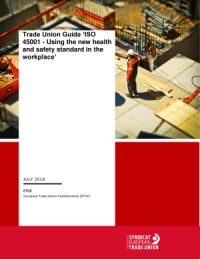ISO 45001 is an international standard for occupational health and safety management systems and is structured to be consistent with existing ISO standards, such as quality management (ISO 9001) and environmental management (ISO 14001).
The standard can be seen as a series of minimum requirements which an employer’s management system must comply with to achieve certification. ISO management standards are designed to be generic, applicable to organisations of all sizes and industry sectors. Whilst the standards provide a framework for good management practice, specifying things that need to be included, they do not say how they must be done. That means there is a lot of freedom in meeting the requirements of the standard.
The standard has a lot on the consultation and participation of workers. Much of this is positive and could be an important way to ensure worker involvement in countries where this does not happen, but there is no mention of unions. There is also no requirement for joint health and safety committees although organisations must support establishing one, which is different. One concern is that the standard does not require employers to issue protective personal equipment (PPE) free of charge, nor to ensure that training is free. These are major omissions, but, in the EU they are already a legal requirement and the standard does state that an organisation must obey all national laws.
Although certain standards, in particular machinery standards, do have some semi-legal status in Europe, ISO 45001 has no legal status at all. This standard also do not guarantee that the employer is complying with health and safety regulations, or any other legal requirements and an employer cannot rely on achieving ISO 45001 certification as a way of automatically fulfilling their legal obligations. Employers must ensure that they follow the requirements of all national laws and collective agreements as well as the Framework Directive and all regulations made under it. ISO 45001 is an “add-on” which an employer may use to try to raise standards.
National versions of this Guide have been published or are in the process of being published. The following national versions are already available:
- United Kingdom
- Belgium (French language version)
- Belgium (Dutch language version)
- Hungarian
- Slovenian
- Latvian
- Norwegian
- Germany (to follow)
Similarly, The Australian Council of Trade Unions (ACTU), has also produced a guide about the new ISO 45001:2018. Health and safety at work is at the centre of the ACTU “Change the Rules” campaign. As many studies around the world have demonstrated, workplaces where unions are active are safer and healthier places at which to work. The ACTU guide is here.

